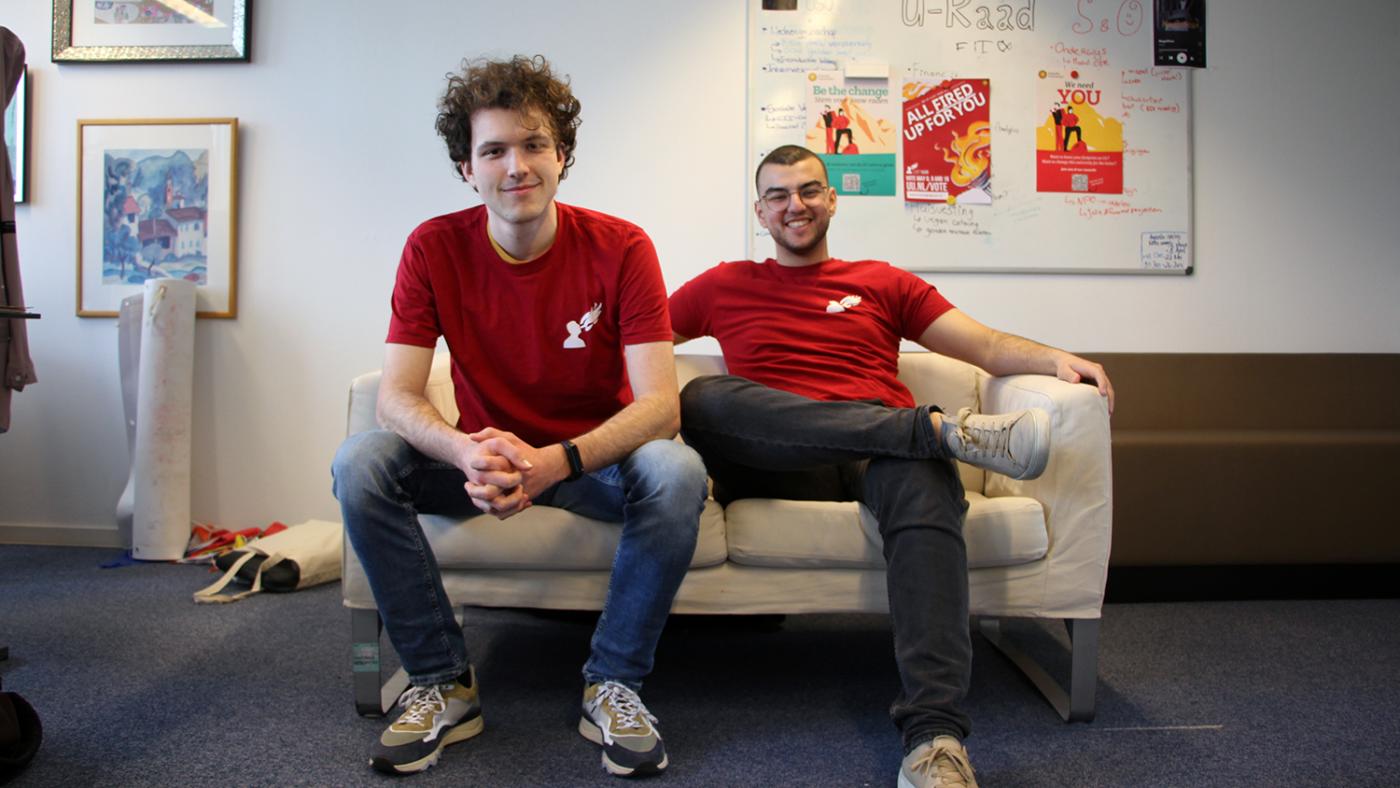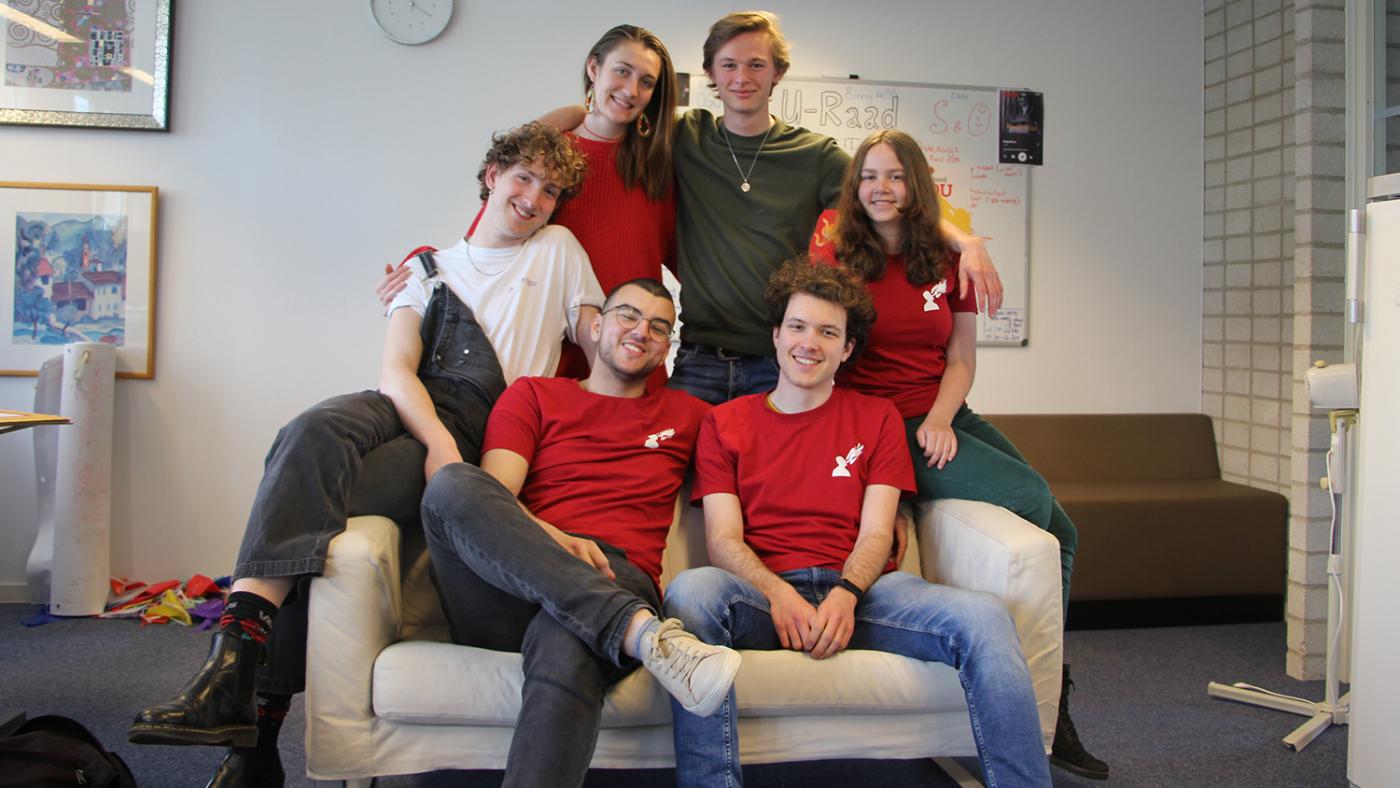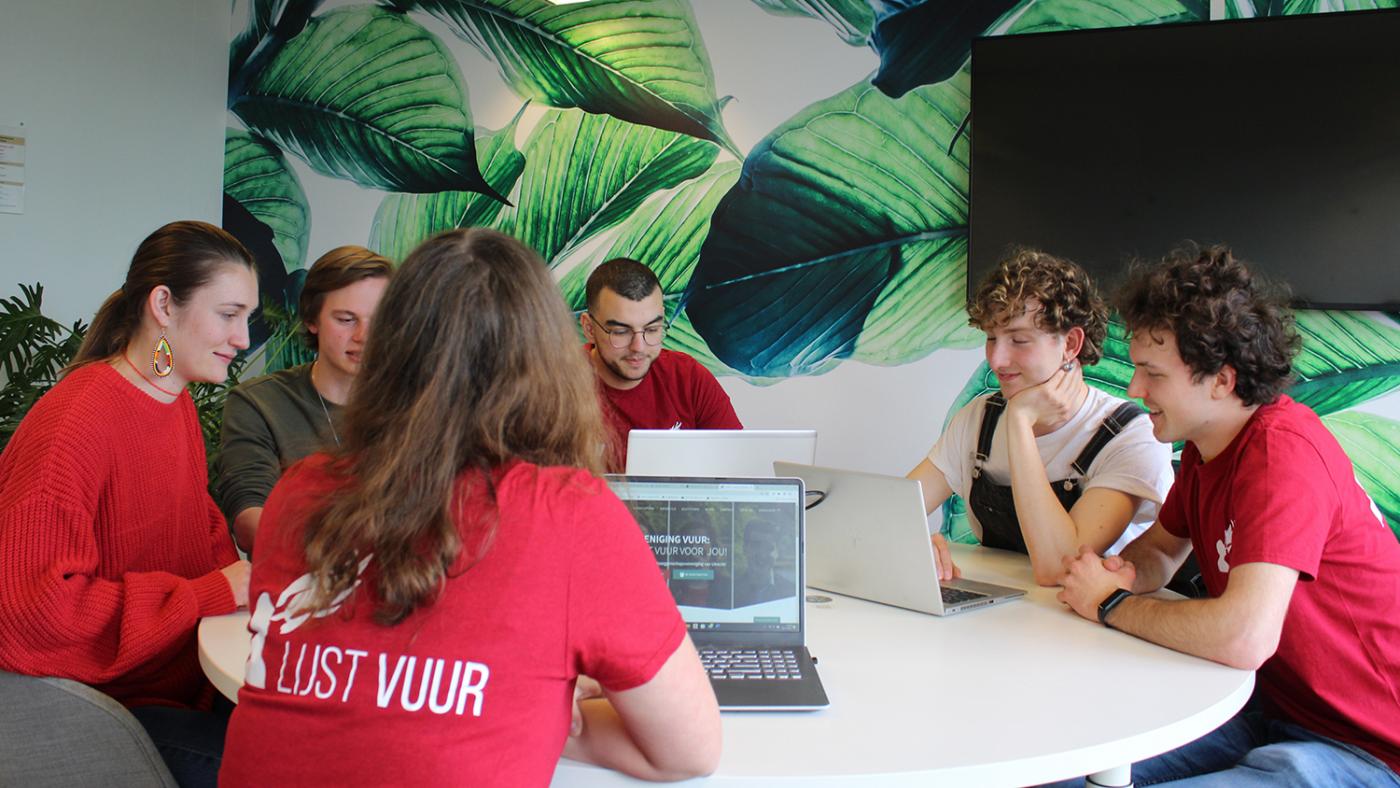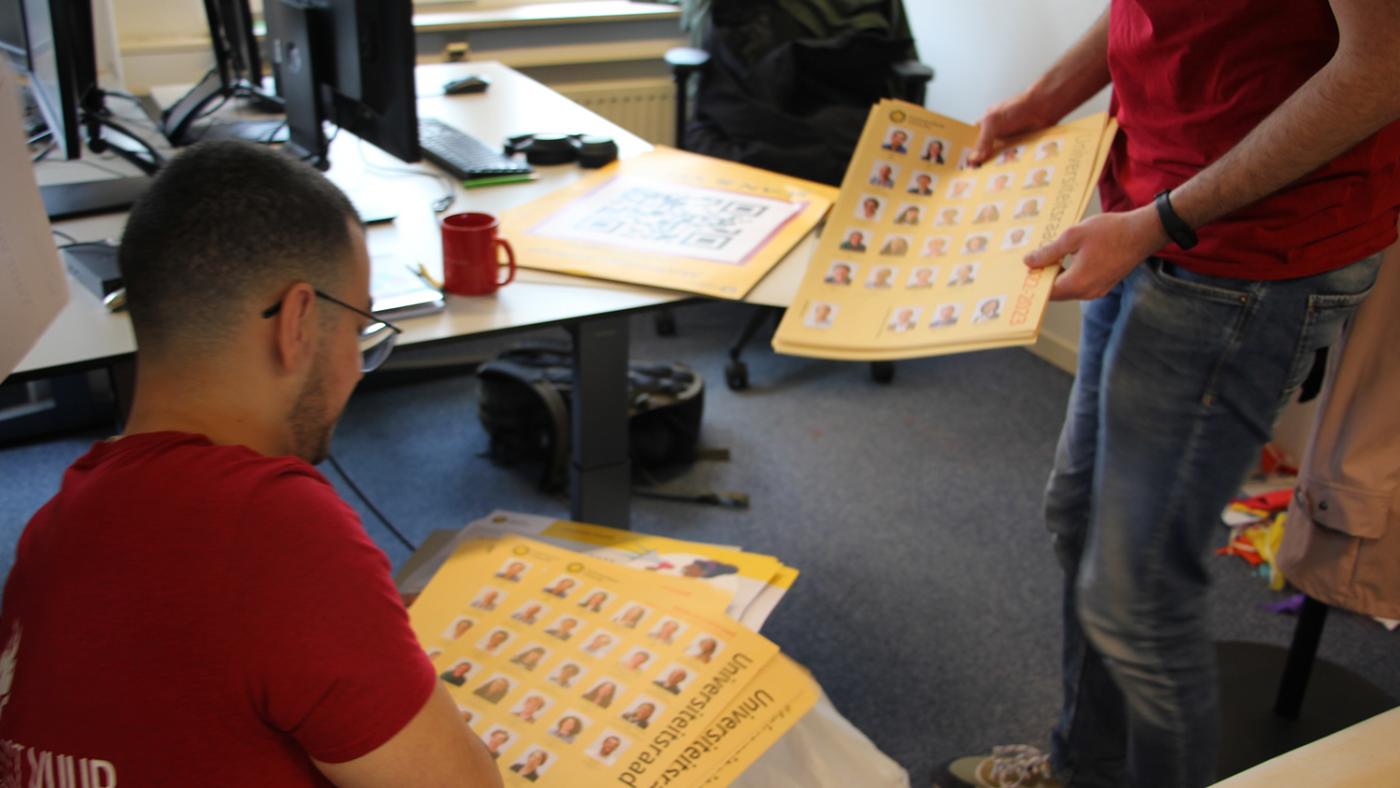DUB follows Vuur's journey
The arduous search for candidates for the University Council

Ismaïl Sarti, a student member of the University Council, watches his phone screen and sees fellow council member Jona van Santen appearing online. He is expecting a message. After all, it’s February 27, the last day that potential candidates for the 2023 elections can register and things aren’t looking good. Jona is part of the application committee and already told him about it the week before. “Hey. And?” Ismaïl immediately asks. Jona is typing… “We only received one application letter.” For a moment, Ismaïl gets bummed out, although he already knew that it was going to be a difficult search. Students aren’t exactly waiting in line to dedicate a year of their studies to the university council.
It’s a problem that many student members are faced with time and again. Last year, Vuur couldn’t find candidates either, even after a great deal of effort. Eventually, they had just enough candidates to fill the fraction for the University Council. On Friday, May 20, 2022, the day before the election results, students from Vuur and the Party for the Utrecht Student (PvdUS) came together in the Utrecht University building, in a room with dark-brown wooden panels overlooking Dom Square. They were told that almost four thousand students had voted, which represents a dramatically low turnout: only 10 percent of the student body. A few years ago, fewer and fewer students were finding their way to the polls but, after the pandemic, the turnout got even worse.
At Vuur however, a party was going on that day. They emerged victorious in the election, securing seven of the 12 seats, while PvdUS got five. However, Vuur had only five candidates on the list who actually wanted to join the council, far too few to fill the seats. Behind closed doors, a crisis unfolded. The list of candidates had long since been finalised and adding new student members was no longer possible. Moreover, Vuur had already had problems before, because a candidate withdrew at the last minute, during the election campaign. Job de Jager, who was already on the University Council and considered a list pusher, made the unusual choice to extend his council work for another year. Job thereby saved the student members somewhat from their dire situation but, in the end, they still had to give away their last seat to PvdUS, which did have enough candidates.
Two smaller student parties, UUinActie and De Vrije Student, had even more difficulties that year: before the elections, they announced that they would not be running for the council because they couldn’t find any candidates. Due to this, the number of student parties in the council went from four to two.
Getting to work
The student members of 2023 don’t want the events of last year to repeat themselves. That’s what they tell each other since mid-January. Christmas hassles are over, the weather is grey and bleak, but dry for the Netherlands. For most students, summer holidays are still far away but not for the students of the University Council. Vuur’s search committee has their work cut out for them if they want to have enough student members by summer. The committee consists of Ismaïl, a board member of Vuur and student members from the faculty councils of Humanities, Social Sciences and Law, Economics, Management and Organisation. They are not only looking for student members for the University Council, but also for the three faculty councils.

Vuu'r s candidates in 2023
Ismaïl is passionate about participatory bodies. There actually isn’t a consultative body he hasn’t been part of: the student council at secondary school, the education advisory committee, the faculty council and, this year, the university council. He did have to temporarily put his studies in Nature & Astronomy and Mathematics on hold, but he enjoys the work and believes that student members like him can really generate improvements, although maybe that sounds a bit lofty. As a first-generation student with Moroccan roots, Ismaïl would love to see another student in the council representing this community. Hopefully, his unlimited dedication to councils will help him in his search.
The meeting in mid-January is the starting signal. TV screens in the university libraries at the Utrecht Science Park and city centre are showing ads. The student members of the University Council are posting campaign videos on their Instagram accounts. They’re asking study and student associations to spread the word. Names are collected, and lists of possible candidates are drawn up. Faculty council members also search for candidates within their own faculty. Not only the search committee is approaching students but also other student members of the University Council, the application committee, student members in the faculty councils, former council members from Vuur, students that are members of the party – pretty much everyone who is in any way involved in the student party is helping with the search.
Little interest
Ismaïl tries to enthuse students by posting a message in WhatsApp groups. “We are looking for successors in the university councils. If anyone is interested, then text or call me.” He approaches students he knows, who he thinks would be suitable for council work. But he has little success and the other members of Vuur aren’t doing much better either.
Ismaïl notes the disinterest is not complete. Students often just don't really know what the University Council does or even that it exists. Having to dedicate an entire year to such a council sound like a lot. Time and money are often the barrier and Ismaïl understands that. If he had not still been living with his parents but instead had to rent an expensive room in Utrecht, he would not have had money for a council year either. Student members usually put their studies on hold for a year to do that or sometimes take one subject per block, but almost always they get delayed in their graduation. Besides, the allowance from the university is not high enough to make ends meet. For most students, a council year equals higher study debt, which can amount to thousands of euros.
Mid-February marks the start of Participation Week, which Vuur and PvdUS are jointly organising to raise awareness about the councils. It is also a chance to get students excited about joining a council. Student members of the faculties are baking poffertjes, a lunch with deans is organised, there are stands in the foyer and an information evening with free pizza.
The University Council organises a lecture with guest former hockey player Jacques Brinkman. Only about ten students turn up - many of them councillors themselves or their acquaintances. There’s room in the hall for seventy people.
On Thursday evening that week, there’s a get-together in Café De Stadsgenoot on Breedstraat: the small pub is jampacked that night. A handful of members and former members of Vuur are having a beer and chatting. Only two students from outside of Vuur visit the evening. They are interested in the candidacy though, and later, one of them will actually send in an application letter. It is then only two more weeks until the deadline.
Ismaïl approaches even more students, but with the umpteenth ‘no’ he’s starting to get frustrated. In the week before the deadline, Jona tells him that things aren’t looking good: it doesn’t come as a surprise and Ismaïl fears that they aren’t going to find enough candidates just like in 2022. This threatens to become a reality when only one application letter is received on February 27, the day of the deadline.
Time for plan B
Vuur's board gives the search committee one more week to find candidates. What they didn’t succeed in doing for a month and a half, should now be done in a week. Time is running out. At the end of April, they have to hand in their final list of candidates at the university, but the application committee still has to conduct all the application interviews, decide on the order of candidates on the ballots and the students themselves also should get some time to think about their decision.
On the day of the new deadline, the search committee meets to deliberate. They have to drastically adjust their strategy; a plan B is needed. They had the best chance of succeeding with students already doing participation work, the members concluded. Perhaps they should focus more on students who have something to do with the issues that are important to Vuur: sustainability, internationalisation, student welfare and education. Students who are already working on these issues might also want to work on them in the University Council. It's just that they have already approached everyone they know themselves: how can they still reach other students? Ismaïl decides to poll his fellow councillors, including Susannah Burger, who has social safety under her belt, and Tamara Luiken, from the sustainability portfolio. "Do you know any other people in your network who would be great in the council?", he asks them. They do, and they give Ismaïl a new list of names.
It’s a week full of tension and stress, in which the search committee goes the extra mile. That week, Ismaïl and Jona are having intensive app contact about how things are going. Gradually, the situation seems to change. Some application letters are trickling in and Ismaïl notices that students he approaches react differently to him. More often they want to know more about the council, and ask him questions about how much time it takes and what they can mean as a council member. And it doesn’t stop there: part of the students say that they are actually going to send in a letter of application.

Lune de Rijck, a student member of the University Council, is having success. They know a lot of people at the university and apparently also the right people because multiple students sign up through Lune. “Can we fill the seats if we get seven again this year?” Ismaïl asks himself during the course of the week. It does look like it, Jona confirms. After the second deadline expires, they turn out to have received eight letters of application. If they keep this up, they will be starting the elections with a full list. At that moment, however, not a single candidate has been determined permanently. Aren’t they cheering too soon?

Final deadline
For Jona, the real work doesn’t start until the second week of March, when the first application interviews are planned. Although there is no such thing as a strict candidate selection: they don’t have that luxury and besides, they’ve picked out the students themselves.
Above all, Jonah wants to get a picture of the candidates so that he and his committee colleagues can decide the best order on the electoral list afterwards. Meanwhile, the search committee continues its search. Ideally, Ismaïl would like to find 12 candidates, for the total number of seats students may fill. During the application process, one potential candidate still withdraws and another no longer responds to the invitation for an interview. Thus, by the final deadline in early April, Vuur still only has six candidates. All of them are motivated and enthusiastic students to whom the current councillors can confidently hand over the baton, but Ismaïl is disappointed. The fact that so few students are interested in participation is hard for him to take. To think how many students Vuur approached in all those months. He alone polled around 30 students for council work. With the help of the other Vuur members, the number must be in the hundreds: three hundred, four hundred, he estimates. The problem of declining interest in participation is bigger and more fundamental than he initially thought.
More students at Vuur are tired of it. Rémi ter Haar, who was on the University Council last year, writes a strong opinion piece (Dutch only, Ed.). about the question of whether Vuur can still take part in the elections. An act of desperation to bring attention to the topic, because at that moment, Vuur, nicely in time, has handed in its list. Eventually, the lists consist of thirty candidates, but only the first six are the real candidates, the others are list pushers. The scenario that was sketched, is real: will there come a time when Vuur cannot find enough candidates and cannot take part in the elections?
Whether Vuur can fill its seats this year will not be known until the election results on May 12. If the result is favourable, the search committee will have to work again despite its months of efforts. Then hopes are pinned on a list pusher who changes their mind after all.

For this article, DUB decided to follow one student party in their search for successors. We choose Vuur because they didn’t have enough candidates last year. PvdUS let us know that they too are having ever more trouble finding candidates for the University Council. However, they handed in a list of thirty candidates this year, of which the first six actually want to become council members.